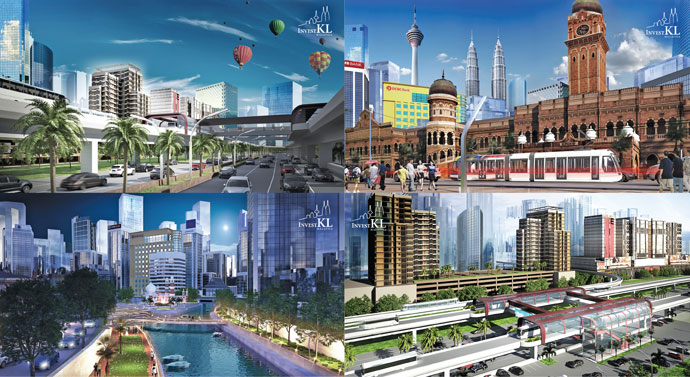Multinational companies (MNCs) look for several key factors when seeking the ideal location in which to establish a regional base of operations. Among these factors are access to market; global connectivity; talent availability for strategic industry sectors; cost competitiveness and an investor-friendly business climate.
Rarely can all these be found in one place. But when they can be found simultaneously, much more is possible than merely a regional operations center or headquarters. Greater Kuala Lumpur, Malaysia’s capital, is a case in point for a competitive Principal Hub location.
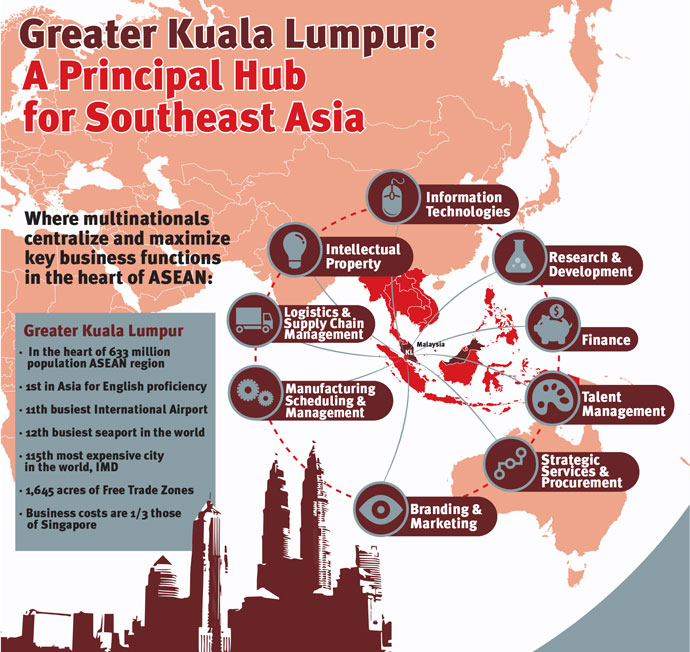
Principal Hub is a centralized base for conducting regional and global businesses and operations. It manages, controls, and supports key functions including management of risks, decision making, strategic business activities, trading, finance, management and human resources.
MNCs establish Principal Hubs to minimize replicating models, and improve quality and speed at a lower cost. By centralizing strategic global/regional intangibles, functions, activities and risks, and their associated revenue streams, a Principal Hub provides better sharing of resources, services (such as management, R&D, payroll, accounting, logistics and quality control), technology and commercialization of products, as well as a platform for further centralization of activities by virtue of natural business evolution or acquisition.
“We see many companies in various sectors, from Consumer Goods to Oil and Gas, establishing Principal Hubs to improve their supply chain, their margins and their efficiency”, says the CEO of InvestKL, Mr. Zainal Amanshah. “Companies from the US and Europe are looking to restructure, to take advantage of the many benefits a Principal Hub can deliver, including opportunities for consolidation, resource and services sharing, cost optimization and tax and financial advantages.”
Greater Kuala Lumpur as a Principal Hub Location
Greater Kuala Lumpur is a unique National Key Economic Area (NKEA) in Malaysia’s Economic Transformation Programme (ETP) — a comprehensive effort that will transform Malaysia into a high-income nation by 2020, as it has a geographical focus rather than the industry focus of the other 11 NKEAs. Being the pillar and engine of the nation’s economic growth, the capital city of 7 million population, contributes RM190 billion (US$60 billion), 30 percent of Malaysia’s gross national income (GNI).
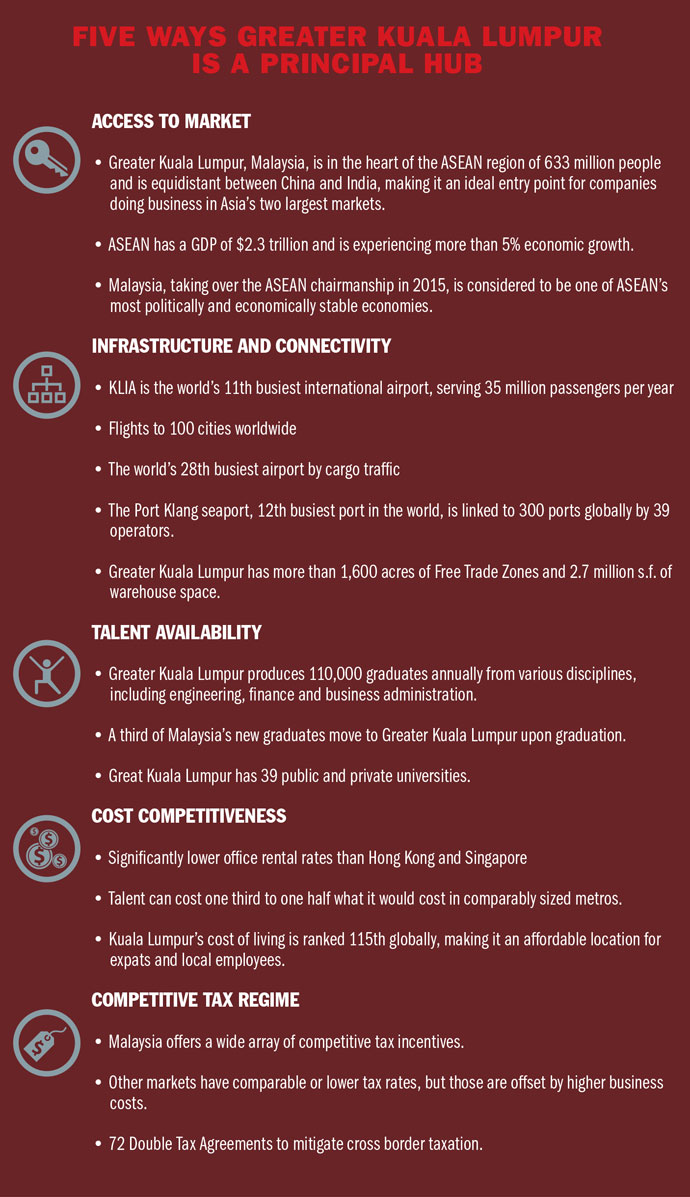
Greater Kuala Lumpur’s value proposition as a Principal Hub is clear: a strategic location at the heart of fast-growing ASEAN with access to 630 million population and a GDP growth rate of 5 percent to 7 percent; global connectivity facilitated by superior infrastructure such as the 12th busiest port in the world — Port Klang and 11th busiest airport in ASEAN by international passenger traffic — Kuala Lumpur International Airport (KLIA); a strong talent pool with high English proficiency; a competitive cost of doing business and inexpensive cost of living, providing an affordable quality lifestyle; and a competitive tax regime and ease of doing business supported by a pro-business government.
“A strong ecosystem and cost go hand in hand as a location of choice for a Principal Hub. If we have a very strong cost proposition but not a very good ecosystem, then it does not work. If we have a good ecosystem but it is not an affordable location, then it is still not a good solution. It is the combination of the two that will produce dynamic results,” says Zainal.
To make the capital city more compelling as ASEAN’s base of operations, a new customized Principal Hub incentive was recently announced in Malaysia’s Budget 2015 to complement Greater Kuala Lumpur’s strengths as the region’s top investment destination.
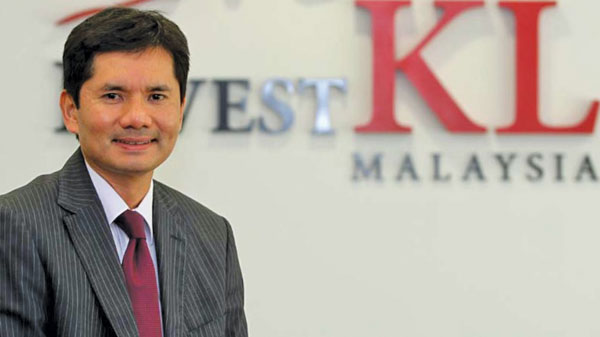
” Companies from the US and Europe are looking to restructure, to take advantage of the many benefits a principal hub location can deliver, including opportunities for consolidation, resource and services sharing, cost optimization and tax and financial advantages.“
— Zainal Amanshah, CEO, InvestKL
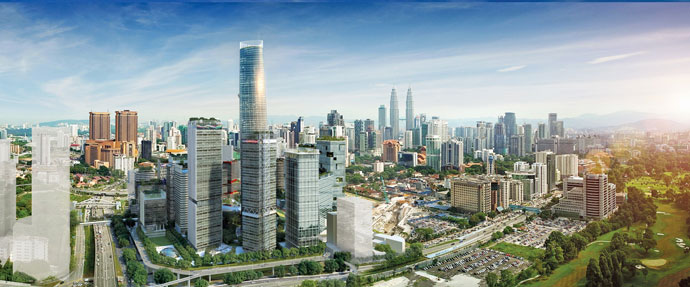
Kuala Lumpur Metropolis will redefine the city’s role as a nerve centre location for ASEAN.
“The new incentive was developed in recognition of changing regional headquarters trends, global supply chain models and also with the upcoming ASEAN Economic Community (AEC) in mind.” Zainal believes the new Principal Hub incentive will attract more MNCs to Greater Kuala Lumpur, which will not only catalyze greater economic activity, but will also generate high-value employment for Malaysians with regional management responsibilities. Small- to medium-sized enterprises (SMEs) will also stand to benefit from the flow-over business opportunities and transfer of knowledge or technology via collaboration efforts with the MNCs.
Partner in Prosperity
MNCs will find a highly cooperative partner in InvestKL. InvestKL is a special purpose investment promotion agency mandated to attract top MNCs to locate their Principal Hubs or regional headquarters in Greater Kuala Lumpur. They adopt a consultative approach to provide end-to-end facilitation services to MNCs interested in using the capital city as their regional base of operations.
Since its inception in mid-2011, InvestKL has assisted 45 MNCs establish their regional operations in Greater Kuala Lumpur. These include AECOM, Cargill, Darden, International SOS, Linde, Saipem, Schlumberger, Worldline by Atos and Zurich Insurance.
“Today, we are targeting high-value investments focusing on value-added services, intellectual property and innovation, moving up the value chain from manufacturing to services,” says Zainal. The MNCs that are in Greater Kuala Lumpur today, looked at the city’s fluid business ecosystem and cost-competitive factor as advantages compared to other cities in the region.
Business consultancy Mercer ranks Kuala Lumpur 115th in its 2014 Cost of Living Survey, making that measure a clear differentiator from potentially competitive markets in the region, like Hong Kong, which Mercer ranks the 3rd most expensive, Singapore (4th) and Shanghai (10th).
Office rental rates are approximately a quarter those of Singapore and an eighth of Hong Kong’s. Also, the talent cost remains competitive with 110,000 new graduates annually from 39 local universities in the city.
Greater Kuala Lumpur is providing a platform for MNCs in ASEAN and as the launch pad across the region and beyond, proving itself as a competitive Principal Hub and regional headquarters location. Much more is possible today in Greater Kuala Lumpur as a regional base of operations than ever before.
This Investment Profile was prepared under the auspices of InvestKL Corporation. For more information, visit www.investkl.com or email info@investkl.gov.my.
